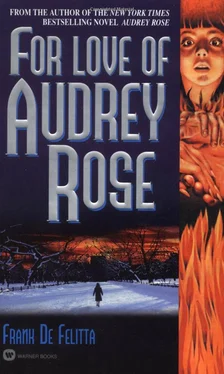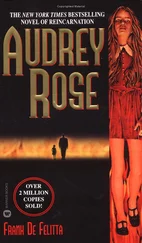“Jennie was diagnosed as mentally retarded,” he said, glancing into the oncoming traffic of the thruway. “But the truth is, she’s autistic.”
Unaccustomed to driving, he swerved at the last moment and endured abuse from a passing trucker. He rolled up the window.
“Autism is a condition in which the child refuses to learn. But she can. I know she can.”
He said no more. Nor did she press him with questions. The rural landscape fled past, an occasional large farm, a billboard, a white truck stuck in a muddy road. It was a clean, efficient countryside, where no surprises, or ruinous poverty or abnormal mysticism could shake the tranquility. Overhead dark rain clouds gathered under the general white cover.
“Things have become… become prepared,” he said. “You’ll see what I mean. But it was necessary for you to see it for yourself.”
“Is it true that you’re connected with a kind of clinic?”
He smiled modestly.
“Yes, it’s true.”
“And the clinic is part of being prepared?”
“It is. And so is Jennie.”
His hand ruffled the child’s silky hair. Jennie arched her back in distaste, then went limp, collapsing against Janice. Hoover smiled fondly and pulled her back toward him. He stroked her cheek softly with an expression that bespoke a heartbreak no longer hidden.
As they drove, an ominous silence grew up between Janice and Hoover. The rain increased from a few droplets spattered against the windshield to a major downpour. Though it was before noon, the traffic had its lights on.
“I’ve come to terms with everything that’s happened,” he finally said, glancing at Janice.
“Why did you come back to Pittsburgh?”
“If I have work to do, I can do it here as well as anywhere.”
Janice watched him. “You must have been curious to see your old home,” she suggested.
“I was. I’ve gone several times. I’ve purged it from my soul.”
Jennie suddenly exclaimed, “Five-nine-nine-two-two!”
Hoover laughed at Janice’s startled expression.
“I’m afraid you’ll have to get used to Jennie’s own language. She speaks fluently in numbers.”
“What did she say?”
“I don’t know. We’re trying to decode it. So far we’ve got about five phrases. Most of which translate roughly as ‘Bug off!’”
Janice, perplexed, studied the little girl who so suddenly had come to life. Jennie stared in animated wonder at the passing urban scene, bounced around in the front seat, captivated by the gleaming displays in shopwindows.
“Eight-eight-seven-nine!” she yelled.
“Maybe the numbers stand for letters in the alphabet,” Janice offered.
“We tried that. Nothing worked. But she’s developing fast. Something will blossom soon.”
The Ford choked and sputtered. Hoover started the ignition again. Ahead of them was Tanner Street, a small lane with an odd collection of broken cars and spilled garbage cans. The rain was letting up, and dirty streaks covered the front windshield.
Hoover stopped the car.
“When do you go back?” he said quietly.
“It depends — on a lot of things.”
He got out of the car, scrambled through the brisk wind that stirred up dust and grit in erratic gusts, and opened her door. When she got out, Hoover reached in and pulled Jennie gently to his shoulder.
“Poor little angel is tired out,” he said. “But I wanted you to meet her right away.”
Puzzled, Janice accepted his hand in the crook of her elbow, and he led her up three cement steps to a green two-story building. Tall bare trees poked up over the roof from behind. A tall security fence girded the structure. Other than that, it looked vaguely like a jerry-built motel.
They ducked in out of the wind, which still threw rainwater into their faces. Hoover slammed the door. For a second it was dark. Then he switched on the light. Janice saw a boy, totally limp, on the floor, crumpled into what appeared to be a lifeless heap.
“That’s James,” Hoover whispered. “Just step over him.”
Cautiously, Janice stepped past the inert form. Before she could ask a question a long, low, painful howl reverberated through the carpeted corridors.
“That’s Henry,” Hoover explained. “He’s been doing a lot of that lately.”
Astounded, Janice followed Hoover and Jennie into the recesses of the building. A tall man with brown skin held a screaming child. The man’s eyes were closed in what appeared to be holy rapture. The child kicked, bit, poked at the restraining arms in terror.
“The gentleman is Mr. Radimanath. He took your message. You’ll meet him later.”
“That child? Is he hurt?”
“No. Like Gertrude, in Hamlet, however, he protests too much.”
Hoover opened a door and they were in his office. The red carpet and red curtains gave a curious flavor to the room where the charts, typewriter, desk, and filing cabinets were located. So did the cushions on the floor in lieu of chairs. Hoover closed the door and the child’s screaming subsided.
“Henry fights against love,” Hoover said quietly, turning on a small lamp, “precisely because he needs it so desperately.”
He turned, smiling, Jennie’s hand reaching absently over his face. Janice, mystified, could only laugh in confusion.
“It will make sense,” he promised. “But you must keep your mind alert, and your eyes open.”
He slid Jennie to the floor, where she lay against a brightly colored cushion. Hoover watched her fondly. Then his shoe toyed with her stomach. She wriggled away.
Something seemed to trouble him again, and a look of distress crossed his face.
“I’ll tell you about Jennie later,” he said softly.
He reached down, found a small blanket at the foot of the desk, and tucked it around Jennie’s small shoulders. Evidently the girl had made a second home for herself in Hoover’s office. Janice saw a red plastic cup with Jennie’s name on the windowsill.
“Who are her parents?” Janice asked.
Hoover shrugged.
“The city of Pittsburgh considers her an abandoned child. A woman named Ora Dunn found her on a bench in a bus station. With a note on her. That’s all we know.”
“And they never tried to find her parents?”
“The city always tries, but seldom succeeds.”
Jennie sighed in her sleep and rolled off the cushion onto the floor. Hoover smiled as he watched her.
“Some day we will have her add numbers for you,” he whispered. “And multiply them. She’s a marvel.”
The awkwardness returned. The silence surrounded them as though a large question had been asked, much too large for either to answer. They found themselves looking at one another.
Hoover reached out a hand and touched her hand softly.
“When I asked how you were, that was no casual question,” he said.
“I know. I’m better than I would have thought, Elliot.”
“Then something worse has happened with Bill?”
“Yes. He’s been judged incurable. They don’t use that word, but he’s going to be transferred to a permanent sanitarium. Presumably to waste away.”
The strain showed in Hoover’s face by a sudden pallor. Janice instantly regretted her outburst.
“Maybe it’s better this way,” she added more softly. “It’s easier to live without false hope.”
Hoover came closer. Instead of touching her or whispering comforting words, he only waited for her to look up at him. She did, and found his eyes troubled and yet containing a spark of hope.
“Janice,” he said quietly, “I may not be too late.”
“What are you talking about?”
“Bill. We may find the key to open him up again.”
Janice turned away.
“We owe it to him to try,” he said, swallowing his guilt. “We can’t give up hope.”
Читать дальше












